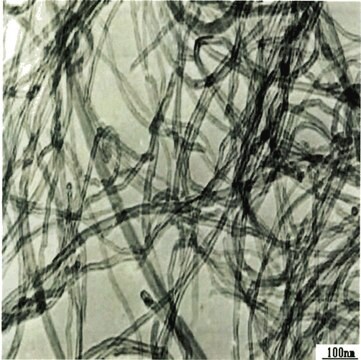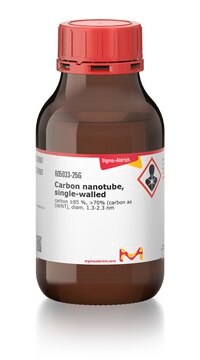406074
Kohlenstoffnanoröhrchen, mehrwandig
powdered cylinder cores, 20-30% MWCNT basis, O.D. × L 7-12 nm × 0.5-10 μm, avg. no. of layers, 5 ‑ 20
Synonym(e):
MWCNT, MWNT, Mehrwandiges Kohlenstoffnanoröhrchen
About This Item
Empfohlene Produkte
Assay
20-30% MWCNT basis
Form
powder
Leistungsmerkmale
avg. no. of layers 5 ‑ 20
Zusammensetzung
carbon content, >99% TGA
AD × L
7-12 nm × 0.5-10 μm
Durchschnittliche Teilgröße
−270 mesh
<53 μm
mp (Schmelzpunkt)
3652-3697 °C (lit.)
Dichte
~2.1 g/mL at 25 °C (lit.)
Suchen Sie nach ähnlichen Produkten? Aufrufen Leitfaden zum Produktvergleich
Allgemeine Beschreibung
Anwendung
Physikalische Form
Angaben zur Herstellung
Sonstige Hinweise
Lagerklassenschlüssel
11 - Combustible Solids
WGK
WGK 3
Flammpunkt (°F)
Not applicable
Flammpunkt (°C)
Not applicable
Persönliche Schutzausrüstung
dust mask type N95 (US), Eyeshields, Gloves
Analysenzertifikate (COA)
Suchen Sie nach Analysenzertifikate (COA), indem Sie die Lot-/Chargennummer des Produkts eingeben. Lot- und Chargennummern sind auf dem Produktetikett hinter den Wörtern ‘Lot’ oder ‘Batch’ (Lot oder Charge) zu finden.
Besitzen Sie dieses Produkt bereits?
In der Dokumentenbibliothek finden Sie die Dokumentation zu den Produkten, die Sie kürzlich erworben haben.
Artikel
Carbon nanotubes (CNTs) have received much attention since their discovery in 1991 by Sumio lijima1 due to their excellent mechanical, electrical, and optical properties.
A nanocomposite is typically defined as a mixture between a host material (e.g., polymer matrix) and nanofillers with at least one dimension of less than 100 nm.
Building and Engineering Micro/Nano Architectures of Single-Walled Carbon Nanotubes for Electronic Applications
Graphene is a one-atomic-layer thick two-dimensional material made of carbon atoms arranged in a honeycomb structure. Its fascinating electrical, optical, and mechanical properties ignited enormous interdisciplinary interest from the physics, chemistry, and materials science fields.
Unser Team von Wissenschaftlern verfügt über Erfahrung in allen Forschungsbereichen einschließlich Life Science, Materialwissenschaften, chemischer Synthese, Chromatographie, Analytik und vielen mehr..
Setzen Sie sich mit dem technischen Dienst in Verbindung.



